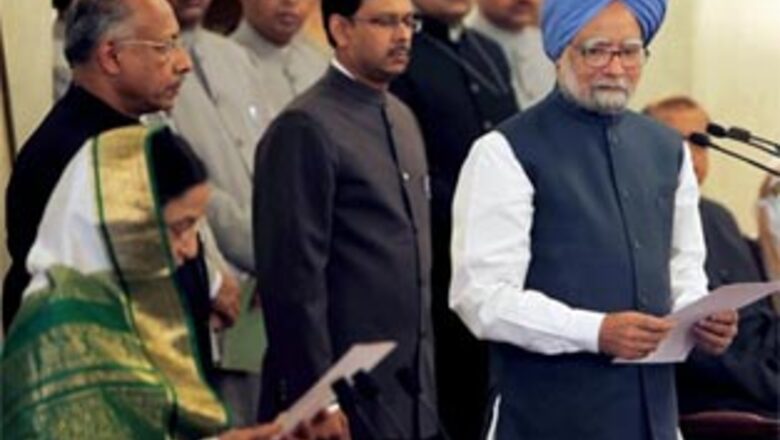
134
views
views
Manmohan took charge as PM for the second consecutive term on Friday.
New Delhi: These are the main challenges facing Prime Minister Manmohan Singh, who was sworn in for a second term on Friday after the election victory of his Congress party-led coalition.
Economy
- Faced with India's highest fiscal deficit since the early 1990s, Singh will have to decide how much to prioritise reforms such as labour laws and privatisations over pressure to spend more on social programmes that helped Congress win the election.
- The new government must lift growth in Asia's third-largest economy amid a global slump and contracting domestic demand. Growth could be as low as six per cent this year compared with nearly double digits in earlier years. Economists believe the economy may now have bottomed, with a return to vigorous likely towards the end of this year.
- A stimulus through higher government spending will increase already-heavy borrowing, which is also crowding out private investment needed to expand factory capacities.
- India's consolidated fiscal deficit is estimated at nine per cent of gross domestic product for 2009/10, and fresh stimulus measures would mean widening the deficit and higher borrowing.
- Another key challenge for the new government and the central bank would be to urge commercial banks to reduce their lending and deposit rates.
- Industry bodies are demanding cuts in corporate and individual income tax rates, and extension of tax breaks for infrastructure sectors. But there is little fiscal space for the new government to cut tax rates this year.
Reforms
- Singh faces pressure to progress on a host of reforms, after years of being blocked by his communists allies during the last government.
- Some reforms that had been blocked by the left will be relatively easy, such as opening up the pension and insurance sector to help access to credit across the economy.
- The government could also move quickly to open up foreign investment in infrastructure projects and the defence sector.
- Other reforms, such as allowing foreign investment in the the retail sector, could face more opposition from within the Congress party, mindful of the millions of small shopkeepers who could lose their jobs.
- Laws to make it easier to hire and fire workers, long a demand of large corporations, could be put on the backburner due to a possible backlash from voters in the middle of an economic downturn.
- Foreign investors may have opportunities in the auto, chemicals and white goods sectors.
Pakistan
- Remains New Delhi's biggest foreign policy challenge after the Mumbai attacks. The relationship between South Asia's nuclear powers is dogged by mutual suspicion and the fate of Kashmir.
- India wants Pakistan to do more to crack down on militants operating on its soil, who have in the past crossed the border and launched attacks on Indian cities. New Delhi accuses its neighbour of egging on militants to destabilise India.
- India may face pressure from the United States to resume a stalled peace process and start talks about Kashmir, as President Barack Obama needs Pakistan's focus to be on fighting a powerful insurgency in Pakistan and Afghanistan.
Doha trade talks
- India must somehow negotiate a favourable deal at the Doha world trade talks. Rich countries have tried to lean on India to agree to open its markets more but India worries hundreds of millions of poor farmers will be hit. Years of negotiations on a deal ran into a brick wall as the United States and large developing countries, especially India, failed to agree on tariff cuts and subsidies.
Climate change
- India, the world's fourth-largest greenhouse gas emitter, may face international pressure to impose legally binding cuts at the next climate change talks in Copenhagen.
- New Delhi has so far refused to play ball, saying priority must go to economic growth and pointing out that it lags well behind rich countries on per-capita emissions.
- India, however, is likely to be one of the biggest casualties of climate change that could dry up its rivers, affect the crucial monsoon rains and wipe out forests and glaciers.




















Comments
0 comment